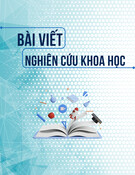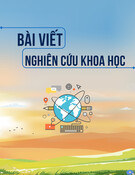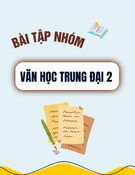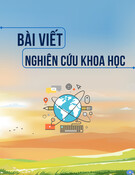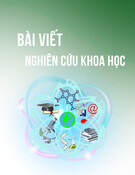
TNU Journal of Science and Technology
230(08): 298 - 307
http://jst.tnu.edu.vn 298 Email: jst@tnu.edu.vn
GENDER IDENTITY IN THE NOVELS OF MARIO VARGAS LLOSA:
A QUEER THEORETICAL PERSPECTIVE
Nguyen Thi Thu Giang*
VNU - HCM, USSH - University of Social Sciences and Humanities
ARTICLE INFO
ABSTRACT
Received:
07/01/2025
Sexual discourse is a significant feature that highlights the distinctive
identity of Latin American literature on the global literary map. Using
a primary research approach that combines queer theory with
historical-cultural analysis and discourse criticism, this article
explores the issue of gender identity in the novels of Mario Vargas
Llosa. The study reveals that his novels portray characters with
fragmented identities, exhibiting numerous manifestations of non-
normative sexualities, and living in constant tension between social
expectations and individual desires. Through such portrayals, Llosa
challenges, redefines, and blurs the boundaries of traditional norms
regarding gender, sexuality, and identity, emphasizing their non-
conformity, diversity, and fluidity. Furthermore, by underscoring how
gender identity is shaped by power relations and cultural systems,
Llosa’s fiction also serves as a critique of the dominant structures that
impose fixed gender and sexual norms in Peruvian society. His work
not only resists these hegemonic discourses but also opens a narrative
space for marginalized identities to be represented and renegotiated
within literature.
Revised:
25/6/2025
Published:
25/6/2025
KEYWORDS
Latin American literature
Mario Vargas Llosa
Queer Theory
Deviant sexuality
Gender identity
VẤN ĐỀ CĂN TÍNH GIỚI TRONG TIỂU THUYẾT MARIO VARGAS LLOSA
TỪ GÓC NHÌN CỦA THUYẾT LỆCH PHA
Nguyễn Thị Thu Giang
Đại học Quốc gia Thành phố Hồ Chí Minh - Trường Đại học Khoa học Xã hội và Nhân văn
THÔNG TIN BÀI BÁO
TÓM TẮT
Ngày nhận bài:
07/01/2025
Diễn ngôn tính dục là một đặc trưng quan trọng, góp phần làm nổi
bật bản sắc riêng của văn học Mỹ Latinh trên bản đồ văn học thế
giới. Với phương pháp nghiên cứu chính là tiếp cận vấn đề tính dục
từ thuyết lệch pha kết hợp với phương pháp lịch sử - văn hóa và phê
bình diễn ngôn, bài viết phân tích vấn đề căn tính giới trong tiểu
thuyết của Mario Vargas Llosa. Nghiên cứu cho thấy các tiểu thuyết
của ông đã khắc họa các nhân vật có bản dạng phân mảnh với rất
nhiều biểu hiện của tính dục lệch chuẩn, sống trong mâu thuẫn giữa
áp lực xã hội và bản năng cá nhân. Thông qua đó, Llosa đã tái định
nghĩa, chất vấn và làm mờ ranh giới của các chuẩn mực truyền thống
về giới tính, tính dục và bản dạng nhằm làm nổi bật sự phi chuẩn, đa
dạng và linh hoạt của căn tính giới. Ngoài ra, với việc nhấn mạnh căn
tính giới còn chịu ảnh hưởng của quyền lực và văn hóa, tiểu thuyết
của Llosa đồng thời cũng là tiếng nói phê phán các hệ thống quyền
lực áp đặt chuẩn mực giới tính và tính dục trong xã hội Peru.
Ngày hoàn thiện:
25/6/2025
Ngày đăng:
25/6/2025
TỪ KHÓA
Văn học Mỹ Latinh
Mario Vargas Llosa
Thuyết lệch pha
Tình dục lệch chuẩn
Căn tính giới
DOI: https://doi.org/10.34238/tnu-jst.11826
*Email: nttgiang@agu.edu.vn

TNU Journal of Science and Technology
230(08): 298 - 307
http://jst.tnu.edu.vn 299 Email: jst@tnu.edu.vn
1. Giới thiệu
Diễn ngôn tính dục như một dòng chảy xuyên suốt lịch sử văn hóa nhân loại, vừa phản ánh
vừa định hình tư tưởng thẩm mỹ, quan niệm về con người và thế giới. Tính dục trong văn học Mỹ
Latinh mang những nét đặc trưng rất riêng biệt với rất nhiều hiện tượng lệch chuẩn, phản ánh xã
hội đa nguyên với các yếu tố như Kyto giáo, truyền thống và hiện đại. Diễn ngôn tính dục chính
là một đặc trưng quan trọng, góp phần làm nổi bật bản sắc riêng của văn học Mỹ Latinh trên bản
đồ văn học thế giới. Trong đó, các tiểu thuyết của Mario Vargas Llosa ở giai đoạn Latin
American Boom đã khai thác mạnh mẽ chủ đề tính dục với cách tiếp cận vô cùng phức tạp và
mang tính hai mặt: không khuyến khích nhưng cũng không phê phán khắc nghiệt, mà đơn giản
phơi bày các ẩn ức sâu kín của con người thông qua các câu chuyện về tình dục bị ngăn cấm.
Việc giải mã các thông điệp tính dục trong sáng tác của Mario Vargas Llosa - chủ nhân giải
Nobel văn học 2010 - mở ra nhiều hướng nghiên cứu tiềm năng, đồng thời đặt ra thách thức lớn
về cách tiếp cận và phân tích.
Nghiên cứu về chủ đề tính dục trong tiểu thuyết của Mario Vargas Llosa đã đạt được nhiều
thành tựu đáng kể. Các nhà nghiên cứu như Kaminsky [1], Irvine [2] và Ahmed [3] đã nhận định
rằng tính dục trong tiểu thuyết Llosa không chỉ là một yếu tố tự sự mà còn là công cụ để chất vấn
các chuẩn mực xã hội và ý thức hệ, đặc biệt qua các nhân vật nữ tự do tính dục: “Thực ra, cách
Llosa xây dựng hình tượng người phụ nữ tự do về tình dục chỉ càng củng cố ham muốn của nam
giới và sự thống trị của hệ tư tưởng gia trưởng đối với phụ nữ” [3, tr. 317]. Cũng có cùng mối
quan tâm đến hình tượng các nhân vật nữ khi nghiên cứu về chủ đề tính dục trong tiểu thuyết
Llosa, hai nghiên cứu của G. Vasuki cùng cộng sự [4] và J. Sarma [5] mang đến những góc nhìn
độc đáo: Vasuki và Madhumidha Stri [4] phân tích quá trình hai nhân vật Bonifacia và Lalita
phải hứng chịu sự bóc lột tình dục trong xã hội phụ quyền và cách họ vươn lên, giành được
quyền tự chủ và tự do cá nhân: “Trong tiểu thuyết Ngôi nhà xanh, Vargas Llosa miêu tả một xã
hội Peru vốn dĩ mang tính phân biệt giới tính, thiên vị dựa trên giai cấp xã hội và bị chi phối bởi
một đời sống chính trị và văn hóa cực kì xấu xa và đạo đức giả. Trong bối cảnh văn hóa và xã hội
này, ông tạo ra những nhân vật nữ không chỉ bác bỏ các cấu trúc điển hình của văn hóa gia trưởng
mà còn phản đối bản chất phân biệt giới tính của một xã hội ưu ái nam giới hơn nữ giới. [...] Họ
xuất hiện như những tác nhân của sự thay đổi và giải phóng, dù chỉ mang tính biểu tượng, dẫn đến
sự trao quyền cho phụ nữ ở khu vực Mỹ Latinh” [4, tr. 1897]. Trong khi đó, tác giả Sarma [5] đã
nhấn mạnh rằng nhân vật gái mại dâm vừa là nạn nhân của sự áp bức và bóc lột tình dục trong xã
hội phụ quyền, vừa là biểu tượng của sự giải phóng tình dục: “Trong tiểu thuyết Đại úy Pantoja và
dịch vụ đặc biệt, Llosa tập trung vào chủ đề tính dục nữ, đặc biệt là hình ảnh gái mại dâm. Trong
số tất cả các phụ nữ ở Peru, gái mại dâm chiếm một vị trí đặc biệt trong các tác phẩm của Llosa.
Như những nạn nhân của một xã hội tàn ác, gái mại dâm đủ điều kiện để nhận được lòng trắc ẩn
mang tính chính trị của Vargas Llosa” [5, tr. 46]. Llosa phê phán mạnh mẽ những chuẩn mực xã
hội bất công và nỗ lực mang lại cái nhìn nhân văn hơn về những người phụ nữ bị gạt ra bên lề xã
hội. Điểm giao thoa của cả hai nghiên cứu là sự phê phán mạnh mẽ xã hội phụ quyền.
Ở Việt Nam, từ khi quyển tiểu thuyết Dì Hulia và nhà văn quèn được dịch vào năm 1986, các
nhà nghiên cứu cũng bắt đầu chú ý đến vấn đề tính dục trong tiểu thuyết Llosa. Tác giả Lê Ngọc
Phương [6] nhấn mạnh rằng chủ đề tính dục trong tiểu thuyết của Mario Vargas Llosa được sử
dụng như một công cụ để phản ánh sự bất công xã hội và phân biệt chủng tộc trong bối cảnh hậu
thực dân, chẳng hạn như trong tác phẩm Thành phố và lũ chó: “Tác phẩm là thế giới của những
cô gái da màu làm điếm. Họ là công cụ làm thỏa mãn bản năng tính dục của đàn ông, mỗi ngày
“tiếp” hàng chục những học viên trốn ra từ trường quân sự. Giống với Márquez trong Sống để
kể lại, Hồi ức về những cô gái điếm buồn của tôi hay Tình yêu thời thổ tả, Llosa cho thấy nỗi cay
đắng của những cô gái điếm - luôn luôn là những cô gái lai da màu - tầng lớp bị xếp vào loại hạ
đẳng và làm những nghề thấp kém nhất xã hội. Cũng giống với Márquez, Llosa nghiêng về việc
mô tả người da trắng trong xã hội, nhưng đồng thời tiểu thuyết của ông vẫn luôn cho thấy nạn

TNU Journal of Science and Technology
230(08): 298 - 307
http://jst.tnu.edu.vn 300 Email: jst@tnu.edu.vn
phân biệt chủng tộc còn tồn tại trong văn hóa Mỹ Latinh” [6, tr. 39]. Trong một bài viết khác,
dưới góc nhìn so sánh, tác giả Lê Ngọc Phương [7] tiếp tục phân tích các yếu tố tính dục trong
tiểu thuyết của Gabriel García Márquez và Mario Vargas Llosa và vai trò của chúng trong việc
phản ánh mối quan hệ phức tạp giữa cá nhân và xã hội, cũng như để phê phán các cấu trúc quyền
lực gia trưởng. Tương tự, bài viết Sức mạnh diễn ngôn tính dục trong một số tiểu thuyết Mỹ Latin
hiện đại của tác giả Nguyễn Thành Trung [8] cũng đã khẳng định diễn ngôn tính dục chính là
phương tiện đắc dụng để các tác giả Mỹ Latin hiện đại - trong đó có Llosa - chất vấn và thách
thức các chuẩn mực xã hội.
Như vậy, chủ đề tính dục trong tiểu thuyết Mario Vargas Llosa được rất nhiều nhà nghiên cứu
quan tâm tìm hiểu. Các nghiên cứu đa số đều nhằm mục đích làm nổi bật mối quan hệ giữa tính
dục, quyền lực và cấu trúc xã hội: tính dục là công cụ phê phán xã hội phụ quyền và bất công
trong các tác phẩm, các nhân vật nữ là nạn nhân của hệ tư tưởng gia trưởng, chủ đề tính dục có ý
nghĩa đặc biệt quan trọng trong việc phê phán nạn phân biệt giai cấp và chủng tộc. Tuy nhiên, các
nghiên cứu trên mới chỉ tập trung vào ý nghĩa phê phán xã hội của chủ đề tính dục mà chưa có sự
kết hợp với các lý thuyết hiện đại như thuyết lệch pha, hậu thực dân hay phân tích tính dục từ góc
nhìn liên ngành. Hầu hết các nghiên cứu tập trung vào nhân vật nữ, trong khi vai trò của các nhân
vật nam và sự liên quan của họ đến diễn ngôn tính dục chưa được quan tâm nghiên cứu. Điều này
có thể làm sáng tỏ hơn các cấu trúc quyền lực trong xã hội mà Llosa miêu tả. Phạm vi tác phẩm
được nghiên cứu của Llosa cũng tương đối hẹp, chỉ tập trung vào một vài tác phẩm như: Ngôi
nhà xanh, Đại úy Pantoja và dịch vụ đặc biệt,… Mặc dù nghiên cứu về tính dục trong tiểu thuyết
Llosa đã đạt được nhiều thành tựu quan trọng, vẫn còn nhiều khoảng trống cần được khai thác để
làm phong phú thêm cách hiểu về chủ đề này.
Hiện nay, trong nghiên cứu về giới và tính dục trong văn chương, thuyết lệch pha (Queer
Theory) đang là một lý thuyết nghiên cứu văn học giàu tiềm năng, thu hút được sự chú ý của
nhiều nhà nghiên cứu [9]-[13]. Tác giả Kaminsky [10] đã khái quát về sự phát triển của thuyết
lệch pha trong văn học Mỹ Latinh, nhấn mạnh sự giao thoa giữa văn hóa, lịch sử, chính trị trong
việc nghiên cứu tình dục và giới tính: “Sự chuyển dịch từ nghiên cứu đồng tính nam và đồng tính
nữ sang nghiên cứu thuyết lệch pha đánh dấu một bước chuyển từ việc khảo sát một kho tàng tác
phẩm sẵn có của các nhà văn đồng tính sang việc sản sinh lý thuyết trong một lĩnh vực mở; từ
các câu hỏi về bản sắc (chẳng hạn như công khai xu hướng tính dục, khẳng định tiếng nói) sang
các câu hỏi về chủ thể tính (chủ thể lệch chuẩn là gì và chủ thể ấy được cấu thành như thế nào?);
từ cộng đồng, ví dụ như một quan niệm có phần lý tưởng hóa về văn hóa nữ giới lấy người đồng
tính nữ làm trung tâm và đường lối chính trị ly khai của đồng tính nữ, sang mối quan hệ giữa chủ
thể lệch chuẩn với cộng đồng chính trị và với quốc gia; từ việc tái hiện các chủ đề đồng tính có
sẵn và có thể phục dựng được sang việc thể hiện các hành vi vi phạm chuẩn mực như là yếu tố
cấu thành các phạm trù như tính dục và giới tính” [10, tr. 210]. Tác giả cũng có một lưu ý đặc
biệt rằng thuyết lệch pha tại Mỹ Latin thường giao thoa với lý thuyết hậu thực dân.
Ở Việt Nam, tác giả Lê Thị Thủy [14] cũng đã khẳng định sự phù hợp của thuyết lệch pha
trong nghiên cứu các biểu hiện của cảm quan đồng tính trong văn xuôi Việt Nam giai đoạn trước
Cách mạng Tháng Tám 1945: “Với những biểu hiện tâm lý phức tạp và đa dạng của dục cảm
biến dị, cảm quan đồng tính trong văn xuôi Việt thời kỳ này cần phải cầu viện đến một lối đọc
đặc biệt vốn được khởi xuất từ lý thuyết lệch pha để phát lộ” [14, tr. 20].
Như vậy, với trọng tâm chính là các vấn đề liên quan đến thiên hướng tình dục và căn tính
giới, thuyết lệch pha tỏ ra vô cùng hữu hiệu khi ứng dụng vào nghiên cứu diễn ngôn tính dục
trong tác phẩm văn học, khơi gợi những góc nhìn mới mẻ, góp phần khẳng định những đóng góp,
sự cách tân của tác giả khi viết về chủ đề tính dục.
Sử dụng thuyết lệch pha làm khung lý thuyết chính, bài báo này tập trung phân tích các khía
cạnh về giới và tính dục vượt ra khỏi các chuẩn mực truyền thống, đặc biệt qua các hiện tượng
tính dục lệch chuẩn, thông qua đó làm nổi bật sự phức tạp và đa chiều của căn tính giới trong 3
quyển tiểu thuyết của Mario Vargas Llosa được dịch và xuất bản tại Việt Nam là Thành phố và lũ

TNU Journal of Science and Technology
230(08): 298 - 307
http://jst.tnu.edu.vn 301 Email: jst@tnu.edu.vn
chó [15], Trò chuyện trong quán Cathedral [16], Dì Hulia và nhà văn quèn [17]. Nghiên cứu
cũng góp phần nhấn mạnh vai trò của văn học trong việc tái định nghĩa các khái niệm về giới và
tính dục. Cách tiếp cận chủ đề tính dục từ thuyết lệch pha cũng đã mở ra những góc nhìn mới để
phân tích văn học Mỹ Latin từ các khung lý thuyết hiện đại và liên ngành.
2. Phương pháp nghiên cứu
Lý thuyết lệch pha (Queer Theory) được áp dụng để cung cấp góc nhìn mới về cách các nhân
vật trong tiểu thuyết của Llosa vượt qua hoặc thách thức các chuẩn mực giới truyền thống, từ đó
phân tích sự giao thoa giữa tính dục, giới tính và quyền lực. Ngoài ra, bài viết còn sử dụng
phương pháp nghiên cứu liên ngành, kết hợp với phương pháp lịch sử - văn hóa và phương pháp
phê bình diễn ngôn để phân tích vấn đề căn tính giới trong tiểu thuyết của Mario Vargas Llosa.
Với phương pháp lịch sử - văn hóa, bài viết đặt các tiểu thuyết của Llosa vào bối cảnh lịch sử,
văn hóa, xã hội Mỹ Latinh, từ đó giúp hiểu rõ hơn những yếu tố lịch sử và văn hóa tác động đến
việc Llosa xây dựng căn tính giới và tính dục trong tác phẩm. Phương pháp phê bình diễn ngôn
được sử dụng để nghiên cứu diễn ngôn tính dục trong các tiểu thuyết, làm rõ vai trò của nó trong
việc phản ánh và tái định nghĩa các quan niệm về giới, tính dục và bản sắc văn hóa.
3. Kết quả nghiên cứu và bàn luận
3.1. Lý thuyết lệch pha (Queer Theory), văn học “queer” và vấn đề căn tính giới
Xuất hiện vào cuối thế kỷ 20 và lấy cảm hứng từ phong trào nữ quyền, lý thuyết giới và lý
thuyết hậu cấu trúc luận, lý thuyết lệch pha đã thách thức và phá vỡ các khái niệm cố định về giới
tính, tính dục và bản dạng trong xã hội. Thuật ngữ “queer” không chỉ đơn giản nói về cộng đồng
LGBTQ+ (tập hợp những người có xu hướng tính dục và bản dạng giới đa dạng, bao gồm đồng
tính, song tính, chuyển giới và các bản dạng khác ngoài chuẩn mực dị tính – nhị nguyên giới) mà
còn ám chỉ bất kỳ sự tồn tại nào lệch pha, không tuân theo các chuẩn mực dị tính hay nhị nguyên
giới tính. Thuyết lệch pha quan niệm rằng bản dạng giới và tính dục không phải là thực thể cố định
mà là quá trình mang tính lịch sử, văn hóa và ngữ cảnh. Các chuẩn mực xã hội về giới và tính dục
là sản phẩm của quyền lực, bị áp đặt thông qua diễn ngôn, thể chế và văn hóa. Sự lệch pha không
chỉ thách thức các chuẩn mực hiện hữu mà còn tái định nghĩa khái niệm bản dạng con người.
Văn học queer không chỉ đề cập đến các tác phẩm có nhân vật thuộc cộng đồng LGBTQ+ mà
còn bao hàm những cách kể chuyện, cấu trúc và diễn ngôn phản ánh sự thách thức với các chuẩn
mực xã hội về giới và tính dục. Văn học queer thường phê phán các cấu trúc quyền lực áp đặt bản
dạng giới, khám phá tính mơ hồ, phức tạp và phân mảnh của bản dạng hay sử dụng ngôn ngữ,
hình tượng và cốt truyện để lật đổ những diễn ngôn thống trị.
Căn tính giới là khái niệm biểu thị cách một cá nhân tự nhận thức về giới tính của mình, có
thể phù hợp hoặc không phù hợp với giới tính sinh học. Trong bối cảnh văn học queer và lý
thuyết lệch pha, căn tính giới trở thành một khái niệm phức tạp và đa chiều, thách thức quan niệm
nhị nguyên giới tính truyền thống (nam/nữ). Văn học queer đặt ra câu hỏi về bản chất và nguồn
gốc của giới tính, cho rằng giới không phải là bản chất cố định mà được tạo ra qua các hành vi và
biểu hiện. Các tác phẩm queer thường mô tả những cá nhân có căn tính giới bị phân mảnh, không
ổn định và nằm ngoài các khuôn mẫu giới tính truyền thống. Đồng thời, văn học queer cũng phơi
bày sự áp bức của các hệ thống quyền lực đối với những cá nhân có căn tính giới lệch pha và sử
dụng chiến lược “kỳ dị hóa” (Queering) để lật đổ các định nghĩa cố định về giới và tính dục,
chẳng hạn như đọc lại các tác phẩm kinh điển qua góc nhìn queer để nhận diện những yếu tố “phi
dị tính” trong văn học truyền thống.
Lý thuyết lệch pha và văn học queer không chỉ dừng lại ở việc miêu tả các căn tính phi chuẩn,
mà còn chất vấn và tái định nghĩa cách mà xã hội hiểu về bản dạng giới và tính dục, tạo không gian
cho các bản dạng bị gạt ra ngoài lề và phá vỡ các cấu trúc diễn ngôn áp đặt, qua đó thể hiện sự đa
dạng và linh hoạt của căn tính con người. Lý thuyết lệch pha và văn học queer không chỉ có ý nghĩa
trong nghiên cứu văn chương mang tính hàn lâm mà còn mang tính chính trị, góp phần thúc đẩy

TNU Journal of Science and Technology
230(08): 298 - 307
http://jst.tnu.edu.vn 302 Email: jst@tnu.edu.vn
quyền bình đẳng và việc chấp nhận sự khác biệt. Căn tính giới, khi được hiểu qua lăng kính queer,
không còn là một bản chất bất biến mà trở thành biểu hiện phong phú của tự do và sự sáng tạo.
3.2. Các biểu hiện tình dục lệch chuẩn trong tiểu thuyết của Mario Vargas Llosa
Tình dục trong tiểu thuyết Llosa không chỉ là một yếu tố của cốt truyện mà còn là một công cụ
để khám phá sự phức tạp của căn tính giới. Trong các tác phẩm như Dì Hulia và nhà văn quèn,
Trò chuyện trong quán La Catedral, Thành phố và lũ chó, ông đã khắc họa một loạt các biểu hiện
tính dục lệch chuẩn bao gồm đồng tính, song tính, loạn luân/nội hôn, lệch tuổi, tình dục với thú.
Llosa không lên án hay khuyến khích những xu hướng này, mà thay vào đó phơi bày chúng như
một phần của thực tại con người và xã hội.
Về tình dục đồng tính, đó là mối quan hệ đồng tính nam giữa Don Fermin và người tài xế da
đen Ambrosio trong Trò chuyện trong quán La Catedral, tình dục đồng giới giữa các học viên
trường quân sự trong Thành phố và lũ chó hay mối quan hệ đồng tính nữ giữa Hortensia và Queta
trong Trò chuyện trong quán La Catedral. Nhưng điều đặc biệt là những mối quan hệ đồng tính
này đều bị che đậy trong bóng tối và các nhân vật này đều có sự ngụy trang giới tính. Có thể nói
rằng, đây là một khuynh hướng tình dục không tự nhiên, các nhân vật sống trong một cuộc đời
hai mặt vô cùng khác nhau, dẫn đến một kiểu loại khác của tình dục lệch pha, đó là “song tính”.
Thuật ngữ “song tính” hay còn gọi là “song tính luyến ái” được sử dụng chính trong trường hợp
biểu lộ sự hấp dẫn của con người về tình cảm hay tình dục, hướng đến cả đàn ông và phụ nữ. Các
nhân vật Don Femin, Ambrosio, Hortensia và Queta và những học viên của trường quân sự nói
trên đều có chung một đặc điểm: có xu hướng tình dục hướng đến cả những đối tượng đồng giới
lẫn khác giới. Tuy nhiên, tất cả họ đều che giấu tình dục đồng tính dưới vỏ bọc bên ngoài của
tình dục dị tính.
Trong Trò chuyện trong quán La Catedral, Don Femin là một doanh nhân da trắng thành đạt,
có vợ là Senora Zoila và một gia đình hạnh phúc và Ambrosio cũng có vợ là Amalia. Ông chủ và
người tài xế đã che giấu mối quan hệ bạn tình lén lút trong suốt một khoảng thời gian dài mà
không một ai hay biết. Chỉ khi người con trai của Don Femin là Santiago điều tra một vụ án
mạng thì sự thật về mối quan hệ giữa cha mình và người lái xe cũ mới được hé lộ. Quan hệ của
họ được miêu tả như một sự đan xen giữa quyền lực và sự kìm nén, tính dục đồng tính bị đẩy vào
“vùng tối” để bảo vệ hình ảnh dị tính bên ngoài. Cô ca sĩ Hortensia là tình nhân của giám đốc an
ninh Caio Bermudes và là chị em tốt với Queta, một cô gái điếm. Thế nhưng, giữa Hortensia và
Queta lại có một mối quan hệ đồng tính nữ. Trong căn nhà của Caio Bermudes thường xuyên
diễn ra những cảnh tính dục nóng bỏng đầy đam mê của họ. Hortensia và Queta là một cặp đồng
tính nữ, nhưng Hortensia vẫn duy trì quan hệ với nam giới, điều này minh họa sự giao thoa giữa
đồng tính và dị tính. Còn trong Thành phố và lũ chó, Alberto có người yêu là nàng Teresa, tuy
nhiên trong một lần đi đến nhà thổ, anh ta bị ả gái điếm Chân Vàng phát hiện: “Tôi biết thừa rồi,
cậu là một thằng gay” [17, tr. 132]. Tuy nhiên, bí mật đó mãi được chôn giấu, trong mắt các bạn
bè trong trường quân sự, Alberto mãi là một nhà thơ tình với những vần thơ gợi dục về vẻ đẹp cơ
thể của người phụ nữ.
Như vậy, qua việc tìm hiểu xu hướng tình dục song tính của các nhân vật, chúng ta có thể thấy
rằng “cái tôi” của tình dục dị tính được biểu hiện ra bên ngoài, phù hợp với vị trí, vai trò của
nhân vật trên thang bậc xã hội, trong khi “cái khác” của tình dục lệch pha bị giấu kín, bị kìm nén.
Ở đây, chúng ta có thể nhận thấy mối quan hệ gắn bó sâu sắc giữa diễn ngôn tính dục và diễn
ngôn Phân tâm học. Các nhân vật trong tiểu thuyết Llosa luôn vật lộn trong cuộc đấu tranh giữa
cái bản năng với lý trí, sự che giấu cái bản năng của những khao khát tính dục đồng tính dưới vỏ
bọc của tính dục dị tính. Những ám ảnh tính dục đồng tính đeo đẳng trong suốt cuộc đời nhân
vật, chẳng hạn như nhân vật Amrosio.
Ngoài tình dục đồng tính, song tính, Llosa còn viết về tình dục loạn luân và lệch tuổi. Câu
chuyện tình yêu đầy sóng gió giữa chàng trai 18 tuổi Marito và người dì Hulia 32 tuổi trong Dì
Hulia và nhà văn quèn đã thách thức những định kiến xã hội về mối quan hệ họ hàng và sự chênh


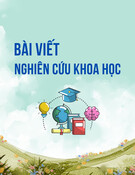
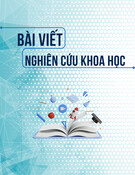
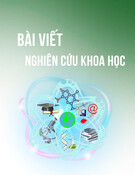
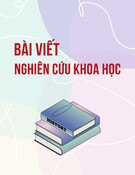




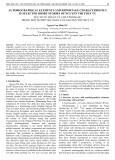
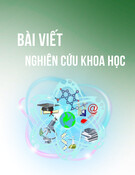

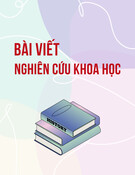
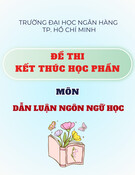
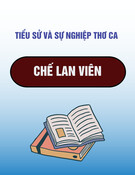
![Ngân hàng câu hỏi môn Tiếng Việt thực hành [chuẩn nhất]](https://cdn.tailieu.vn/images/document/thumbnail/2025/20251003/kimphuong1001/135x160/21861759464951.jpg)
![Bài giảng Văn học phương Tây và Mỹ Latinh [Tập hợp]](https://cdn.tailieu.vn/images/document/thumbnail/2025/20251003/kimphuong1001/135x160/31341759476045.jpg)

